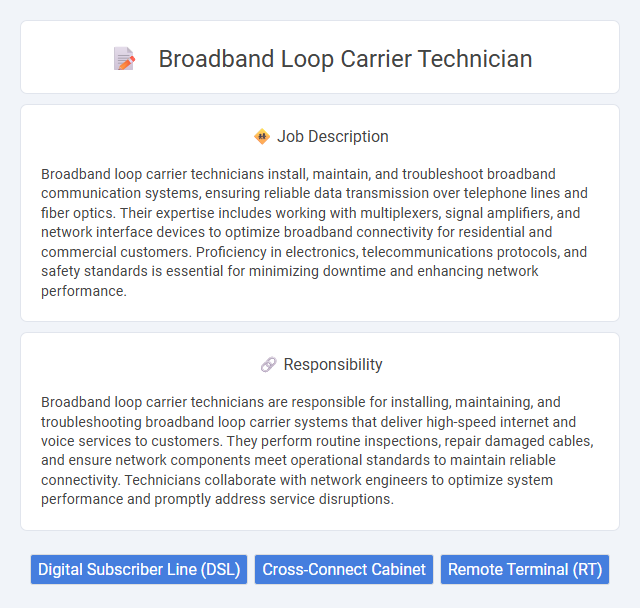
Broadband loop carrier technicians install, maintain, and troubleshoot broadband communication systems, ensuring reliable data transmission over telephone lines and fiber optics. Their expertise includes working with multiplexers, signal amplifiers, and network interface devices to optimize broadband connectivity for residential and commercial customers. Proficiency in electronics, telecommunications protocols, and safety standards is essential for minimizing downtime and enhancing network performance.
Broadband loop carrier technician roles may be suitable for individuals comfortable with physical work and handling technical equipment in outdoor or confined spaces. Those with strong problem-solving skills and a tendency to work independently or in small teams might find this job aligns well with their capabilities. People who prefer routine tasks with minimal physical demands may find the conditions challenging or unsuitable for long-term satisfaction.
Qualification
Broadband loop carrier technicians require expertise in telecommunications systems, including knowledge of fiber optics and copper wire infrastructure. Proficiency in troubleshooting, installation, and maintenance of broadband loop carrier equipment, combined with certification in relevant networking technologies such as Cisco or CompTIA, is essential. A background in electronics or telecommunications technology, along with strong problem-solving skills, enhances effectiveness in this role.
Responsibility
Broadband loop carrier technicians are responsible for installing, maintaining, and troubleshooting broadband loop carrier systems that deliver high-speed internet and voice services to customers. They perform routine inspections, repair damaged cables, and ensure network components meet operational standards to maintain reliable connectivity. Technicians collaborate with network engineers to optimize system performance and promptly address service disruptions.
Benefit
Broadband loop carrier technicians likely enjoy benefits such as competitive wages and comprehensive health insurance packages. There is a strong probability of access to retirement plans and paid time off, enhancing work-life balance. Opportunities for career advancement and specialized training may also be common in this role.
Challenge
Broadband loop carrier technicians likely face complex troubleshooting challenges due to the intricate nature of modern telecommunications infrastructure. They may encounter frequent issues with signal interference and hardware malfunctions requiring quick diagnostic skills. The high probability of evolving technology demands continuous learning and adaptability in their problem-solving approach.
Career Advancement
Broadband loop carrier technicians specialize in installing, maintaining, and troubleshooting broadband network components that support high-speed internet and voice services. Career advancement opportunities often include progressing to senior technical roles, network engineering, or management positions within telecommunications companies. Gaining certifications in network technologies and hands-on experience with fiber optics and digital transmission systems can significantly enhance job prospects and salary potential.
Key Terms
Digital Subscriber Line (DSL)
Broadband loop carrier technicians specialize in installing, maintaining, and troubleshooting Digital Subscriber Line (DSL) systems that enable high-speed internet over traditional copper telephone lines. They ensure optimal signal quality and resolve connectivity issues by calibrating DSL equipment and monitoring network performance using specialized diagnostic tools. Mastery of DSL protocols, network architecture, and voice-data integration is essential for efficient broadband loop carrier service delivery.
Cross-Connect Cabinet
A Broadband Loop Carrier technician specializes in installing, maintaining, and troubleshooting Cross-Connect Cabinets that manage fiber optic and copper cable connections within telecommunications networks. These cabinets serve as critical junction points enabling seamless signal distribution and ensuring optimal broadband performance across local loops. Expertise in fiber splicing, cable routing, and connector testing is essential for maximizing network reliability and reducing service interruptions.
Remote Terminal (RT)
Broadband loop carrier technicians specialize in installing, maintaining, and troubleshooting Remote Terminal (RT) systems that extend broadband services to end users in dispersed or rural areas. RTs serve as critical nodes in telecommunications networks, converting and amplifying signals between central offices and subscriber lines to ensure high-speed data transmission and voice quality. Proficiency in fiber optics, network protocols, and equipment calibration is essential for optimizing RT performance and minimizing service disruptions.
 kuljobs.com
kuljobs.com